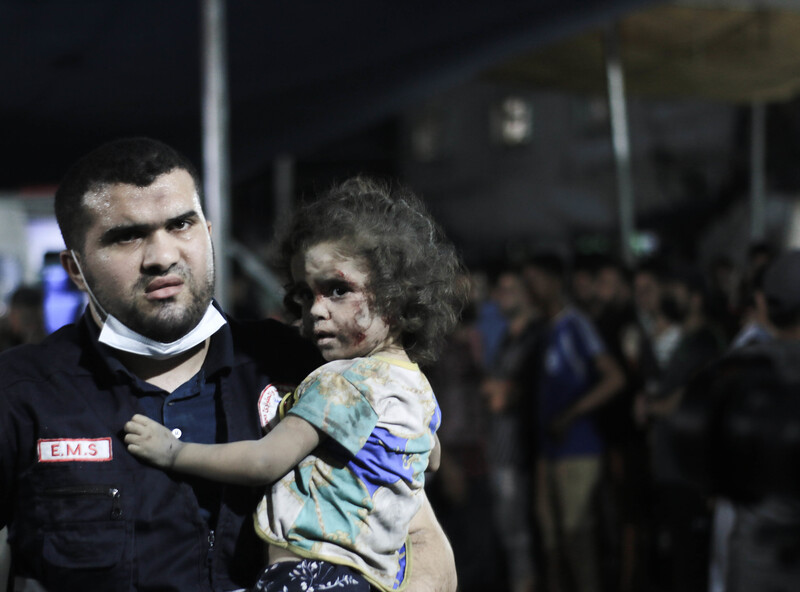The Electronic Intifada 31 October 2023

The pain of Gaza’s children is indescribable.
APA imagesThere is an urgent need to look beyond statistics in Gaza – even as the death toll keeps rising.
Casualties are not mere numbers. They represent the lives, dreams and hopes of a people experiencing barbaric aggression by Israel’s military occupation.
Let us reflect, too, on the pain of everyone who has been bereaved.
Ahmad is a father of three.
He recently found himself rushing with his children to a shelter as air raid sirens sounded. His wife Fatima was visiting her elderly parents a few blocks away.
Fatima was killed when Israel fired a missile at her parents’ home.
“I have seen how quickly our lives could fall apart,” Ahmad said. “Words cannot describe the pain I’ve been left with. No one should have to go through this type of loss.”
The most painful aspect of the war is the toll it takes on children.
Farah, 8, has already witnessed two wars in her short life, each more devastating than the previous one.
“It’s really scary,” she said. “I want to be a teacher, but sometimes I can’t go to school because of the loud noises of Israeli bombs, drones, and F-16s. I lost my close friend Nora, who used to live next to our house. I used to do homework and study with her for exams. I will miss her a lot.”
Poignant memories
As a first-year student, Muhammad was full of enthusiasm. He had hoped that through studying in the Islamic University of Gaza, he would not only gain knowledge but contribute toward building a brighter future for his community.
That was before Israel caused immense destruction to the university.
“The campus was not just a physical space,” said Muhammad. “It represented my dreams and the dreams of many others. The Israelis have destroyed everything. They destroyed all the beautiful places where we had made the most wonderful memories with families and friends.”
Salwa, 26, is an aspiring architect. She has worked tirelessly to realize her goal of designing sustainable buildings for her neighborhood.
Her life was turned upside down when Israel bombed the building in which he lives. Salwa is nonetheless adamant that she will pursue her ambitions.
“I imagine that sustainable architecture will rise from the ashes of this genocide in Gaza,” she said. “Despite the tragedy surrounding me, I am clinging to hope. I am holding on to my dream of a better tomorrow.”
In Gaza today, there are parents who cannot accept that they have lost children.
There are parents who are haunted by the thought that a child was hungry when he or she was killed.
There are people who insist on having a lock of hair from a loved one before a burial takes place. A tiny piece of a person who was cherished.
There are people hoping against all the odds that members of their family who were trapped beneath rubble will somehow be rescued.
There are people sharing poignant memories – such as the memory of a daughter’s wedding that took place just before this latest war began.
We deserve better
There are people who put all their savings into their homes, only to see everything bombed to pieces.
There are people who had been planning celebrations.
There are girls who were talented artists, other children who wanted to be doctors.
The genocide that Israel is committing in Gaza is not an abstract geopolitical issue. It is a humanitarian crisis that requires immediate global attention.
The stories of victims should inspire people around the world to stand up for peace, demand an end to the Israeli occupation, and work for a future in which the Palestinian people can live without fear.
We must remember that people killed in Gaza are not just statistics shown on a screen. They led lives – short lives in too many cases.
Behind every victim, there is a story of love, loss and resilience.
The people of Gaza and every corner of Palestine deserve better.
Ever since the Nakba – the 1948 ethnic cleansing of Palestine – our lives have been defined by state-imposed violence and suffering.
The stories of people killed during this war should serve as a call for justice and liberation.
Our country stretches from the River Jordan to the Mediterranean Sea. All of it should be free, with Jerusalem as the capital.
People of the world must challenge the status quo and raise their voices for peace. In the future, Palestinian people must be allowed to thrive, rather than just survive.
Ghada Hania is a researcher and translator based in Gaza.





